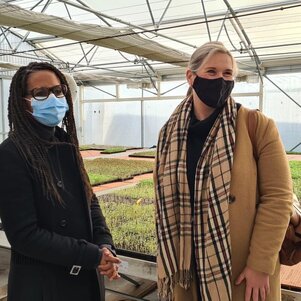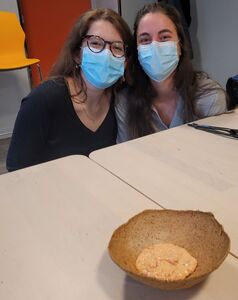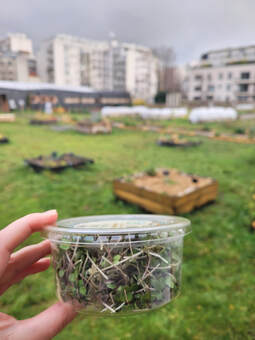 Paris' Deputy Mayor Audrey Pulvar with Cara Augustenborg at Le Paysan Urban.
Paris' Deputy Mayor Audrey Pulvar with Cara Augustenborg at Le Paysan Urban. Le Paysan Urbain is one of 238 urban farms supported by the City of Paris, producing a wide array of microgreens using fully sustainable methods, including an impressive greenhouse with sustainably heated water circulated through the seed tables to keep them warm year round.
From the farm, Audrey then took me to nearby Smart Food Paris incubation hub where I met three entrepreneurs born out of this initiative:
| - Maximillien Ngyuyen of Excellent (plant-based) Burger with no crappy chemicals or imported soya in his burgers like the usual meat alternatives. It had my taste buds completely fooled! |
| - And the two passionate designers behind Somalte -Tasty, nutritious edible bowls perfect for festivals and other events where reusable food containers aren’t practical. The bowls are made from hops residues from local microbreweries so they’re also a great example of putting circular economy and zero waste principals into practice. PS: They’re crowdfunding to upscale their enterprise at the moment, if you’ve got some spare dosh to invest! It struck me that Ireland could really use an equivalent organisation that puts national, sustainable food security at the heart of its ethos as opposed to our entirely export led focus on food production. |
| One common thread across all these initiatives was a need for more sustainable packaging. It’s a major issue for food products that need controlled humidity, protection from damage, and attractive packaging options with no easy solutions yet. (That’s a hint for budding Irish product designers, by the way.) I thought the vegetable based plastic was a good alternative, but today I learned the GM-based ingredients usually travel from the USA to Asia for processing and then back to Europe for sale. I also thought the reusable bamboo and composable containers were a good alternative to plastic but it turns out they are full of sealant chemicals that can end up in our foods. As Kermit said: “It ain’t easy being green”. |
| Both have struggled with the challenge of implementing taxes on carbon pollution in the past, but both have improved their approach to citizen participation in policy development via Citizens Assemblies, which have driven much more interesting climate and environmental legislation recently. Both countries now face the challenge of implementing these new policies and laws at a pace that aligns with the urgency of the climate crisis, while also ensuring a just transition for those employed or dependent on high-carbon industries. |
| I continue my Parisian exploration tomorrow with meetings with representatives from political parties and farmers’ unions along with members of France’s High Climate Council, which I’m expecting to be directly relevant to my work on Ireland’s own Climate Change Advisory Council. At the end of tomorrow, I head off to Montpellier by super fast train to spend day three getting back to my roots with some intensive agricultural research. My brain is already swimming with ideas and my notebook is nearly full. I might possibly explode from either mental inspiration or all the lovely food! |
-Cara






 RSS Feed
RSS Feed
